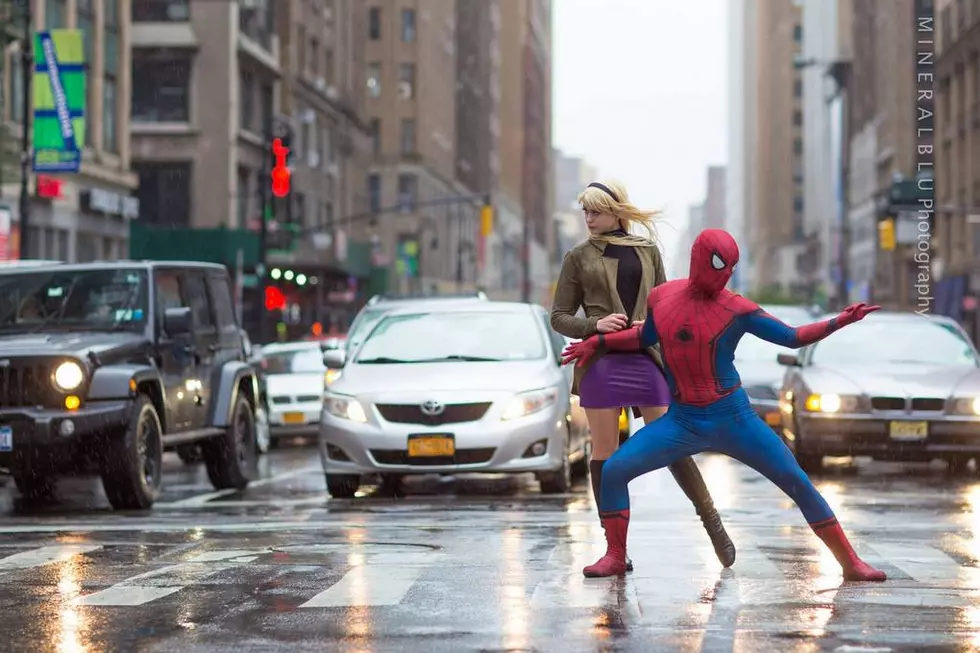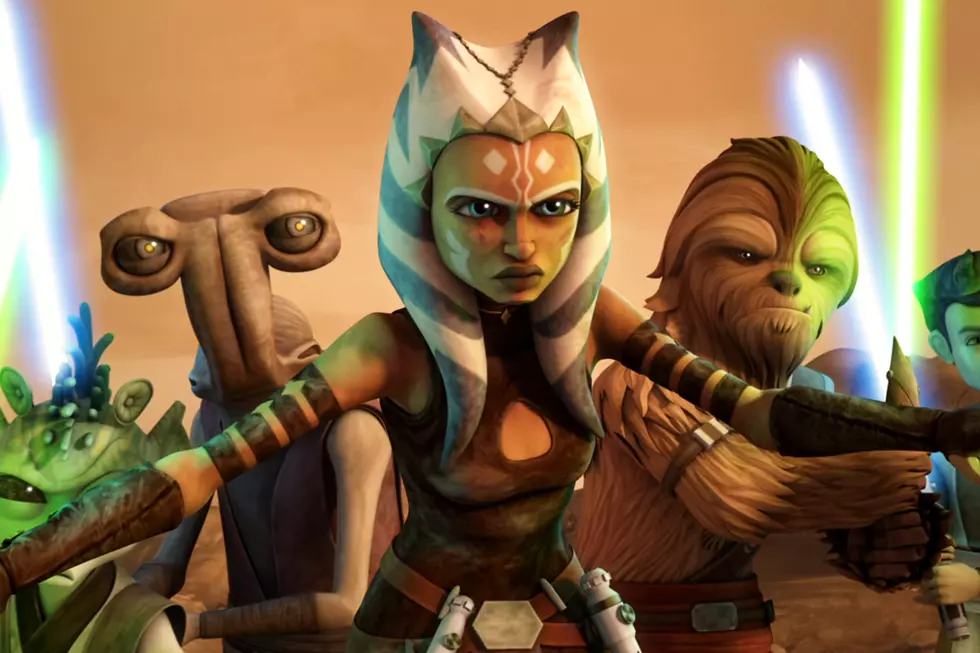
No Leia Haters: Why Retiring the Slave Bikini From ‘Star Wars’ is Excellent News
According to Facebook comments by artist J. Scott Campbell, Marvel and its parent company Disney are phasing out the "Slave Leia" costume from their merchandising and publications. If the reports are true, the move suggests that Disney is stepping away with the most degrading canon representation of one of Star Wars' few female characters in an effort to broaden the appeal of the franchise to include more women and girls. The metal bikini and elf shoes could soon be a thing of the past.
And to this I say: it's about frickin' time.
"Slave Leia," for those somehow not in-the-know, refers to the costume forced on Princess Leia by crime lord Jabba the Hutt in Return of the Jedi. The outfit, in the context of the film, is designed to show Leia's forced subservience to Jabba. Leia shows up at his digs in full bounty hunter gear to rescue Han Solo, but Jabba figures it out, and the next time we see her she's been forced into this role and this outfit without her consent, and turned into an object to decorate a gross slug's throne room. When Leia resists, Jabba tells her --- in the most lecherous way possible --- that she will learn to love him.
This setup is meant to degrade Leia. But it endures as an icon of the franchise because it's a version of the character that sits at the intersection of male nerd culture's inability to parse context (see also: nerds who lionize Rorschach as a hero) and their proclivity to turn everything into something to masturbate to (see also: Frank Cho's T&A drawings of a schoolgirl; a certain subset of Brony fandom). It's an embarrassment.
Campbell's pouting that, "We can't even draw Leia in a sexy pose at Marvel, let alone in that outfit" underscores the problem. In the films, Princess Leia is a beautiful, capable badass who will fire a blaster or toss a farm boy into a trash compactor while wearing any number of great outfits, from the bounty hunter costume (my personal favorite), to a flowing gown, to forest camouflage. Why does a certain stripe of fans think that the only version of Leia that's "sexy" is the one where she's half-naked and enslaved?
But the problem isn't the outfit itself. As Lumberjanes writer Noelle Stevenson put it:
There's a subset of fandom that will tell you that Slave Leia is empowering. They'll say that because Leia took the chains meant to render her subservient and choked out the slug who held her captive (it's called subtext, kids), this somehow makes her objectification okay; even fun and sexy.
This is obviously not true. There is nothing sexy about sexual slavery. There is nothing empowering about sexual slavery. This insistence on glorifying the objectification of this character only persists because male nerds will do anything to preserve their fantasies above the needs of any other section of the audience. Let's not pretend otherwise.
It's the same argument that gets brought up whenever a female comics character is redesigned to eliminate or mitigate an overtly sexualized costume. There's a stamping of feet and an outcry about "oppression," and the fans always try to justify sexualized costumes as "empowering." If you push these people to think about who is hurt by these representations and who benefits, you're decried as a "social justice warrior" --- which sounds rad, and why would you not want to be one of those?
There was an essay making the rounds on Twitter from an artist who was worried that the "SJW"/"PC" types were forcing creators to "self-censor" their work for fear of bringing the wrath of social media down on them. I'm not going to link to it, because it's a dumb piece, but I don't see what's so bad about thinking about the ramifications of what you draw or write.
And who does this "self-censorship" hurt? Artists can still draw whatever they want to draw. Fans can still crank it to whatever they want to crank it to. The FBI will not bang down your door and smash your Slave Leia maquette while they perp walk you out to the paddy wagon to some black site prison that Obama doesn't want you to know about.
All this edict changes is that a prevalent version of a main character of an intellectual property intended for adults and children is not one where she's forced into sexual slavery. All it changes is that artists can no longer get a Disney paycheck for their Slave Leia art.
If Disney feels like Slave Leia sends a message that is not in line with the Princess Leia character, and that sexualizing their main female character is bad for business and harmful for the fandom --- and guess what? Both of those things are true! --- then that is Disney's right, and it's not any kind of censorship. It's brand management. If it means more people feel comfortable enjoying Star Wars, that's something all Star Wars fans should be OK with.
Carrie Fisher, in a conversation with Force Awakens star Daisy Ridley for Interview magazine, had this to say about the outfit and the sexualization of Leia:
Having strangers come up to you and tell you about their sex fantasies involving you seems real "fun" and "empowering," right?
Times are changing for Star Wars fans since the Disney buyout of LucasFilm. The division is now overseen by longtime Hollywood producer Kathleen Kennedy, who was handpicked by George Lucas. If you've seen a Spielberg movie or any classic '80s movie that Spielberg also produced, you're familiar with her work. While I greatly admire Lucas and love the Star Wars Universe, it's clear from some of his ideas --- like the racist caricaturing in Jar Jar Binks' speech pattern, the literally cartoonishly flamboyant Ziro the Hutt from the animated Clone Wars feature, or the exclusion of female fighter pilots from the space battle all the way back in Return of the Jedi --- that the franchise could benefit from the points of view of people besides a ridiculously rich, middle-aged, cisgender, heterosexual, white man.
From the most crass perspective, a more diverse fanbase means more dollars for Disney. More importantly, there's something very powerful about being able to see someone who looks like you, or feels the way you do, presented as a hero on a big screen, on TV, or in the pages of a book or a comic book.
There's already been a huge push for more diverse characters to populate the Star Wars universe, from the almost 50/50 gender-split of the cast of the Star Wars: Rebels series, to the female and gay main characters introduced in Star Wars: Aftermath, to the fact that The Force Awakens stars a woman, a black man, and a Latino man. It's hard to invite more women to enjoy Star Wars when the image of its original sole female character is frequently depicted as a sex object in literal chains.
The fans decrying the retirement of Slave Leia, or raging that Disney put gay in their Star Wars, are not the Han Solos or Luke Skywalkers of their stories. They're Jabba the Hutt. And we all know what happened to that guy.
Get to Know More About the Star Wars Comics of the Past
More From ComicsAlliance








![Rey and BB-8 Aren’t Just Best Friends, They’re the Best Hot Toys Star Wars Figures Yet [Review]](http://townsquare.media/site/622/files/2016/10/IMG_1449.jpg?w=980&q=75)
